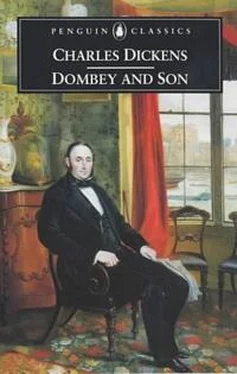'Oh, Polly,' says Miss Tox, 'when I looked in to have a little lesson with the children just now, I got the message that you left for me; and as soon as I could recover my spirits at all, I came on after you. Is there no one here but you?'
'Ah! not a soul,' says Polly.
'Have you seen him?' whispers Miss Tox.
'Bless you,' returns Polly, 'no; he has not been seen this many a day. They tell me he never leaves his room.'
'Is he said to be ill?' inquires Miss Tox.
'No, Ma'am, not that I know of,' returns Polly, 'except in his mind. He must be very bad there, poor gentleman!'
Miss Tox's sympathy is such that she can scarcely speak. She is no chicken, but she has not grown tough with age and celibacy. Her heart is very tender, her compassion very genuine, her homage very real.
Beneath the locket with the fishy eye in it, Miss Tox bears better qualities than many a less whimsical outside; such qualities as will outlive, by many courses of the sun, the best outsides and brightest husks that fall in the harvest of the great reaper.
It is long before Miss Tox goes away, and before Polly, with a candle flaring on the blank stairs, looks after her, for company, down the street, and feels unwilling to go back into the dreary house, and jar its emptiness with the heavy fastenings of the door, and glide away to bed. But all this Polly does; and in the morning sets in one of those darkened rooms such matters as she has been advised to prepare, and then retires and enters them no more until next morning at the same hour. There are bells there, but they never ring; and though she can sometimes hear a footfall going to and fro, it never comes out.
Miss Tox returns early in the day. It then begins to be Miss Tox's occupation to prepare little dainties — or what are such to her — to be carried into these rooms next morning. She derives so much satisfaction from the pursuit, that she enters on it regularly from that time; and brings daily in her little basket, various choice condiments selected from the scanty stores of the deceased owner of the powdered head and pigtail. She likewise brings, in sheets of curl-paper, morsels of cold meats, tongues of sheep, halves of fowls, for her own dinner; and sharing these collations with Polly, passes the greater part of her time in the ruined house that the rats have fled from: hiding, in a fright at every sound, stealing in and out like a criminal; only desiring to be true to the fallen object of her admiration, unknown to him, unknown to all the world but one poor simple woman.
The Major knows it; but no one is the wiser for that, though the Major is much the merrier. The Major, in a fit of curiosity, has charged the Native to watch the house sometimes, and find out what becomes of Dombey. The Native has reported Miss Tox's fidelity, and the Major has nearly choked himself dead with laughter. He is permanently bluer from that hour, and constantly wheezes to himself, his lobster eyes starting out of his head, 'Damme, Sir, the woman's a born idiot!'
And the ruined man. How does he pass the hours, alone? 'Let him remember it in that room, years to come!' He did remember it. It was heavy on his mind now; heavier than all the rest.
'Let him remember it in that room, years to come! The rain that falls upon the roof, the wind that mourns outside the door, may have foreknowledge in their melancholy sound. Let him remember it in that room, years to come!'
He did remember it. In the miserable night he thought of it; in the dreary day, the wretched dawn, the ghostly, memory-haunted twilight.
He did remember it. In agony, in sorrow, in remorse, in despair! 'Papa! Papa! Speak to me, dear Papa!' He heard the words again, and saw the face. He saw it fall upon the trembling hands, and heard the one prolonged low cry go upward.
He was fallen, never to be raised up any more. For the night of his worldly ruin there was no to-morrow's sun; for the stain of his domestic shame there was no purification; nothing, thank Heaven, could bring his dead child back to life. But that which he might have made so different in all the Past — which might have made the Past itself so different, though this he hardly thought of now — that which was his own work, that which he could so easily have wrought into a blessing, and had set himself so steadily for years to form into a curse: that was the sharp grief of his soul.
Oh! He did remember it! The rain that fell upon the roof, the wind that mourned outside the door that night, had had foreknowledge in their melancholy sound. He knew, now, what he had done. He knew, now, that he had called down that upon his head, which bowed it lower than the heaviest stroke of fortune. He knew, now, what it was to be rejected and deserted; now, when every loving blossom he had withered in his innocent daughter's heart was snowing down in ashes on him.
He thought of her, as she had been that night when he and his bride came home. He thought of her as she had been, in all the home-events of the abandoned house. He thought, now, that of all around him, she alone had never changed. His boy had faded into dust, his proud wife had sunk into a polluted creature, his flatterer and friend had been transformed into the worst of villains, his riches had melted away, the very walls that sheltered him looked on him as a stranger; she alone had turned the same mild gentle look upon him always. Yes, to the latest and the last. She had never changed to him — nor had he ever changed to her — and she was lost.
As, one by one, they fell away before his mind — his baby— hope, his wife, his friend, his fortune — oh how the mist, through which he had seen her, cleared, and showed him her true self! Oh, how much better than this that he had loved her as he had his boy, and lost her as he had his boy, and laid them in their early grave together!
In his pride — for he was proud yet — he let the world go from him freely. As it fell away, he shook it off. Whether he imagined its face as expressing pity for him, or indifference to him, he shunned it alike. It was in the same degree to be avoided, in either aspect. He had no idea of any one companion in his misery, but the one he had driven away. What he would have said to her, or what consolation submitted to receive from her, he never pictured to himself. But he always knew she would have been true to him, if he had suffered her.
He always knew she would have loved him better now, than at any other time; he was as certain that it was in her nature, as he was that there was a sky above him; and he sat thinking so, in his loneliness, from hour to hour. Day after day uttered this speech; night after night showed him this knowledge.
It began, beyond all doubt (however slow it advanced for some time), in the receipt of her young husband's letter, and the certainty that she was gone. And yet — so proud he was in his ruin, or so reminiscent of her only as something that might have been his, but was lost beyond redemption — that if he could have heard her voice in an adjoining room, he would not have gone to her. If he could have seen her in the street, and she had done no more than look at him as she had been used to look, he would have passed on with his old cold unforgiving face, and not addressed her, or relaxed it, though his heart should have broken soon afterwards. However turbulent his thoughts, or harsh his anger had been, at first, concerning her marriage, or her husband, that was all past now. He chiefly thought of what might have been, and what was not. What was, was all summed up in this: that she was lost, and he bowed down with sorrow and remorse.
And now he felt that he had had two children born to him in that house, and that between him and the bare wide empty walls there was a tie, mournful, but hard to rend asunder, connected with a double childhood, and a double loss. He had thought to leave the house — knowing he must go, not knowing whither — upon the evening of the day on which this feeling first struck root in his breast; but he resolved to stay another night, and in the night to ramble through the rooms once more.
Читать дальше











